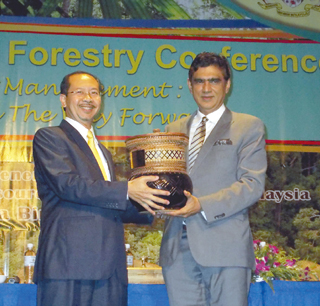7 resolutions on forest management
Published on: Friday, November 14, 2014

KOTA KINABALU: The two-day 17th Malaysian Forestry Conference themed "A Century of Forest Management: Lessons Learnt & the Way Forward" attended by 600 and held at the Sutera Magellan, concluded here Wednesday with seven draft resolutions. Recognising the new technology, innovation and good practices are crucial to realise sustainable forest management, the conference resolved that: Advanced technologies and innovative approaches including the integrated use of state of the art remote sensing and geospatial technology be continually explored and used for conservation, protection and other forestry activities;
ADVERTISEMENT
The mitigation of climate change through the implementation of Sustainable Forest Management (SFM) practices, such as forest restoration and reforestation be further intensified;No net loss of biodiversity and preferably a net gain be considered to reduce further biodiversity loss;Adequate and sustainable financing be sourced locally and internationally; including appropriate incentives to promote and enhance conservation and SFM activities; High Conservation Value (HCV) assessment and monitoring of forests be implemented and strengthened; and
ADVERTISEMENT
Capacity building in new technologies, innovation and best forest management practices be emphasized and strengthened. Recognising the role of forest governance in enhancing forest law enforcement to achieve sustainable forest management:
ADVERTISEMENT
Forest management certification for promoting responsible management of forests and ensuring that forest management practices are compliant with established forestry certification standards, be further encouraged; Up-to-date technologies be used to enhance the effectiveness of forest law enforcement;The on-going programme to implement Forest Law, Enforcement, Governance and Trade (FLEGT) initiatives to tackle illegal logging and to verify legality of timber produced based on Timber Legality Assurance System (TLAS) be further studied; andForest issues in Malaysia in relation to sustainable forest management, biodiversity conservation, environmental protection and trade be addressed in a holistic manner, taking in account the views of foresters, non-government organisations and other stakeholders.Recognising the importance of conservation of forest biodiversity, the conference resolved that: Efforts to collate and document information of rare, endangered and threatened plant and animal species for promoting their conservation be intensified; Sustainable supply of high quality seeds and other planting materials be made available to support conservation initiatives;Ecological corridors and forest connectivity among fragmented forests be given due emphasis;Law enforcement on the protection of rare and endangered flora and fauna be enhanced; andMore funding be made available for forest biodiversity research and conservation.Recognising the importance of forest plantations and other sources of timber for sustaining the wood-based industry, the conference resolved that: Further research be carried out to produce high quality materials and to develop appropriate plantation siviculture practices for enhancing the protection of plantation timber;Involvement of the private sector and small holders in forest plantation development be encouraged with more attractive incentives;Forest plantation be further intensified;Improved forest engineering practices to minimize the damages as well as to maintain and to increase productivity; Certification of forest plantations be actively pursued;Sharing of R&D findings and germplasm exchange among planters be encouraged; andR&D on utilisation of plantations, mangrove and lesser known species be further intensified.Recognising the significant contribution of forest ecosystem services to human health and livelihoods, wildlife habitat and diversity, watershed protection, carbon storage, and recreation, the conference resolved that Potential ecotourism areas and opportunities in Malaysia be identified and promoted;Ecological footprints, such a carrying capacity, limits of acceptable change and life; cycle analysis be evaluated in the development and management of ecotourism areas, especially those that harbor threatened and/or endangered species;The long-term monitoring of environmental services using cost-effective methods and approaches be put in place;Mechanism for the Payment for Ecosystem Services (PES) be explored and promoted, and the owners and providers of the services be duly compensated;The development and sustainable management of urban forest parks be encouraged;Sustainable financing for forest ecosystem services, such as those provided by Central Forest Spine of Peninsular Malaysia, Heart of Borneo, and forest recreational sites, be secured; andThe private sector, including the logging industry, be encouraged to recognise and support ecosystem services of forests and that fiscal incentives be explored to encourage them to contribute financially to the protection and enhancement of ecosystem services of forests.Recognising the important role of local communities in forest management, the conference resolved thatGreater participation of local communities / indigenous people if forestry related activities be encouraged;Greater emphasis be given to capacity building and enhancement of public awareness of the importance of forest conservation in upgrading of community livelihood;Innovative initiatives be undertaken to raise funds through suitable mechanisms such as PES for the maintenance and upgrading of recreational forests and nature reserves; andConsolidated efforts be given to enhance collaboration among key agencies involved in planning and management of forest resources as well as enforcement of the National Blue Ocean Strategy. Recognising the importance of regulating and providing legal recognition to the forestry profession in Malaysia, the conference resolved that:The Forestry Profession Bill, which is being drafted by the Institute of Foresters Malaysia (IRIM) and the Ministry of Natural Resources and Environment, be supported; The assistance of the Ministry of Natural Resources and Environment and the Attorney General Chamber be sought to expedite the introduction of the Forestry Profession Bill;The views of the State governments, which constitutionally have jurisdiction over forestry matters, be given due consideration, including their prerogative to enact their own respective statutes and regulations;Stay up-to-date by following Daily Express’s Telegram channel.
Daily Express Malaysia




